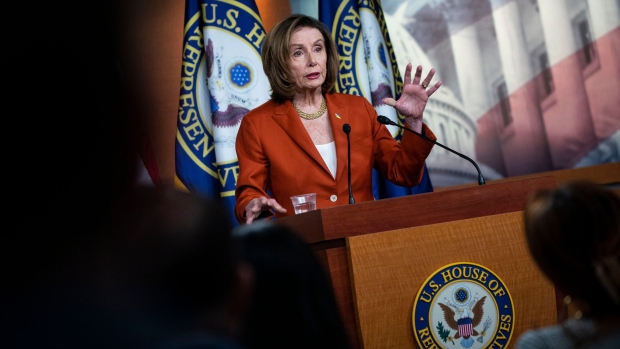Mar 9, 2022
House Passes $1.5 Trillion Spending Measure With Ukraine Aid
, Bloomberg News

(Bloomberg) -- The House passed a long-delayed $1.5 trillion spending bill that would fund the U.S. government through the rest of the fiscal year and provide $13.6 billion to respond to Russia’s invasion of Ukraine.
The vote, on Wednesday night, followed a day of political drama that saw emergency coronavirus funding stricken from the measure, which passed just in time for Democrats to depart for their previously planned retreat in Philadelphia.
The 2,741-page bill was approved in two tranches, with the defense portion passing on a 361 to 69 vote and the domestic agency funding passing on a 260 to 171 vote.
Senate Democrats intend to vote on the bill before the current three-week stopgap bill expires at midnight Friday. To hedge its bets and avoid a government shutdown, the House also sent the Senate a four-day spending bill through March 15.
Domestic agencies will receive their biggest increases in years under the bill, a major policy achievement for Democrats who have struggled to pass President Joe Biden’s larger economic agenda. The bill, approved nearly five months after the start of the fiscal year, is the product of tough talks with Republicans who pressed for defense increases that matched domestic spending.
“I didn’t get everything I wanted in the bill. I say to my members, ‘Look at what is in the bill and what it does for America’s working parents,’” House Speaker Nancy Pelosi said. “As long as you are going to need 60 votes in the Senate you are going to have to compromise.”
The legislation would provide $730 billion for non-defense discretionary spending, a 6.7% increase. And it contains billions in so-called earmarked funding for lawmaker pet projects, the first measure to do so following a 2011 ban after a series of scandals.
Claiming Victory
Republicans secured an increase to military spending that is far larger than progressive Democrats, some of whom voted against the defense portion, and the White House wanted. The annual spending for the Pentagon alone comes to $743.4 billion, $28.4 billion above the president’s request of $715 billion for the year.
The GOP also defeated Democratic efforts to allow taxpayer funding for abortions, legalize marijuana in the District of Columbia and extend the wider eligibility for free school lunches instituted during the pandemic.
“This bill overall is a big improvement from where we were a month ago,” Senator Richard Shelby of Alabama, the top Republican on the Appropriations Committee, told reporters. “We’ve got parity for defense, dollar-wise.”
The $13.6 billion in emergency Ukraine-related spending also contains $6.5 billion for the Pentagon, including $3 billion to bolster U.S. troops in Europe and $3.5 billion to replace weapons given to Ukraine.
The bill also contains a grab bag of additional legislation hitching a ride on the must-pass vehicle. These include:
- A stalled bill to revive and restructure the EB-5 visa which grants green cards to wealthy investors
- A measure that helps loans based on the soon-to-be defunct Libor reference rate transition to a new alternative.
- Reauthorization for the Violence Against Women Act
- Clear powers for the Food and Drug Administration to regulate electronic cigarettes as tobacco products.
“For the first time in a long time, I believe we show just how government can work for working people once again and to achieve the betterment of humankind,” House Appropriations Chair Rosa DeLauro said.
The bill’s passage also clears the way for billions from last year’s bipartisan infrastructure bill to be unlocked. According to the Congressional Budget Office, $197 billion from that $550 billion law cannot be released for use over 10 years unless annual appropriations bills are enacted.
Furious Hours
What should have been a day of political triumph for Democrats devolved into in-flighting after rank-and-file lawmakers discovered cuts to aid to their states.
After furious hours of negotiations in Pelosi’s office, Democrats removed a section of funding for the pandemic that was paid for by those cuts, which were part of an earlier Covid-19 relief bill.
Democrats reconstructed the $15.6 billion for urgent pandemic testing and treatment as a standalone bill they will vote on next week. The legislation, now stripped of the state and local offsets demanded by Republicans, has uncertain prospects in the evenly divided Senate.
The chaos surrounding the legislation was the latest example of intra-party squabbling among Democrats who spent much of the last year battling each other over the size and scope of Biden’s agenda. It also illustrated again how slim a majority Pelosi has to work with to accomplish even basic tasks.
©2022 Bloomberg L.P.


